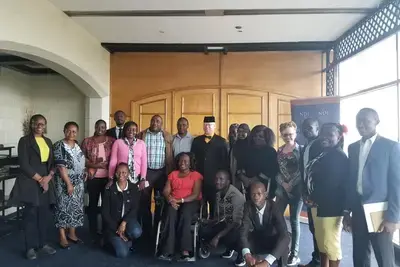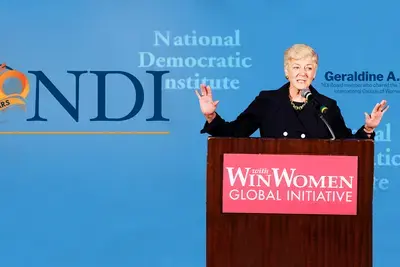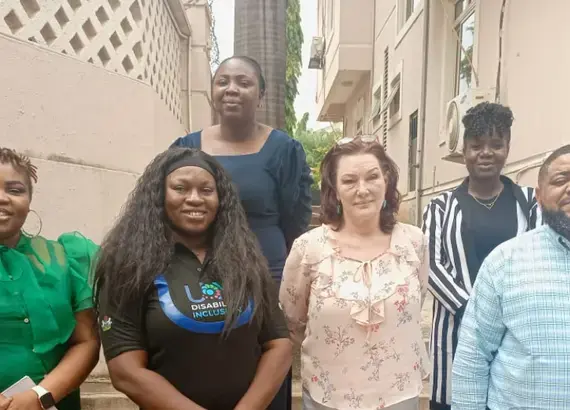
Gender, Disability Inclusion and Access consultant Hellen Beyioku-Alase (front row, second from left) visits with staff at the National Democratic Institute office in Nigeria, while Nigerian sign language interpreters facilitate communication access.
Success Story
Amplifying the Voices of Women Leaders with Disabilities
First invoked by the South African disability rights movement in the 1990s, “Nothing About Us Without Us” became the clarion call of activists organizing to overcome systemic oppression and empower persons with disabilities to take control over decisions affecting their lives. Since then, the concept has anchored the work of the global disability rights movement and its demand for the full and equal inclusion of persons with disabilities. Despite some progress in making its voice heard, the disability community – especially women with disabilities – remains largely excluded from public life and decision-making processes.
Nearly one in five women worldwide have a disability in comparison to one in seven men. The higher prevalence of disability among women is linked to multiple factors, including higher rates of gender based violence that results in a disability, lack of access to education and discriminatory healthcare practices that may result in disability. For women with disabilities, rights infringements are compounded when their disability status and gender intersect. For too long, the issues of women with disabilities have remained invisible both within the disability rights movement and the women’s rights movement.
In response to these challenges, it is critical to apply a disability and gender lens to ensure women with disabilities are included in decision-making processes and can exercise their rights on an equal basis as other citizens. With an emphasis on fostering collective political action, NDI is collaborating with Mobility International USA (MIUSA) to support disability activists across sub-Saharan Africa – including women leaders with disabilities – to work with other human rights defenders to define common priorities, develop organizing and political engagement strategies, and advocate for issues important to them.
As part of this project and in line with the “Nothing About Us Without Us” principle, NDI and MIUSA identified local women leaders with disabilities in four countries – Kenya, Nigeria, Malawi, and Zambia – to serve as consultants on gender equality, disability inclusion, and accessibility. Together, these consultants and NDI staff in each country are engaging with disabled peoples’ organizations and broader human rights organizations to devise strategies to advance gender and disability inclusion.
Among the consultants are Hellen Beyioku-Alase from Nigeria and Scader Louis from Malawi. NDI interviewed Hellen and Scader to better understand the specific barriers to participation women with disabilities face in their countries and how these can be addressed through collective political action.
What does inclusion in civic and political life mean to you?
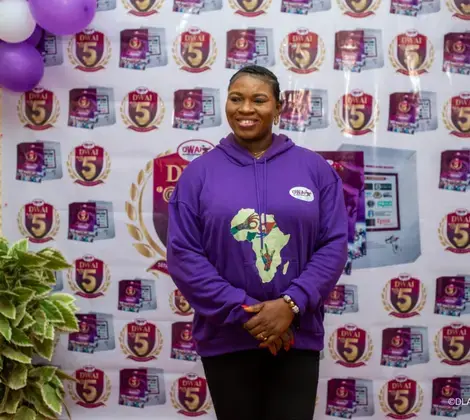
Hellen: As a Deaf woman living in Nigeria, inclusion in civic and political life means having the same rights, opportunities, and access as everyone else, regardless of my hearing status. This includes the right to vote, run for office, participate in public meetings, and express my opinions freely. It also means having access to information and resources in formats that I can understand, such as sign language interpretation and closed captioning.
Inclusion is important to me because it allows me to be a full and active member of my community. I want to have a say in the decisions that affect my life, and I want to contribute my skills and talents to make my community a better place.
I believe that inclusion is essential for Deaf people to live full and productive lives. We have the same potential as everyone else, and we deserve the same opportunities to reach our full potential.
Scader: To me, [inclusion in civic and political life] means being intentional in ensuring true participatory democracy, thus removing all undue barriers to allow every citizen to engage in the civic and political discourse. Furthermore, ensuring the political decision table reflects the diversity and voices of all citizens, irrespective of their background or abilities.
Advocacy on meaningful involvement of women with disabilities in electoral processes is critical now because the upcoming general elections in 2025 present an opportunity to influence positive changes that can enhance their effective and meaningful participation, both as candidates and as voters.
What motivates you to be an active and engaged citizen?
Hellen: I am hopeful that one day, Deaf people in Nigeria will be fully included in all aspects of society. We will have the same rights, opportunities, and access as everyone else, and we will be able to contribute our unique perspectives to make our communities stronger.
Scader: Realizing how strong and powerful one voice can be, even when the whole world is silent on injustices around me.
Describe some of the ways that women with disabilities in your country are participating. What challenges or barriers to political participation remain?
Hellen: Unfortunately, Deaf people in Nigeria often face discrimination and exclusion. We are often denied access to education, employment, and healthcare. We are also underrepresented in government and decision-making processes.
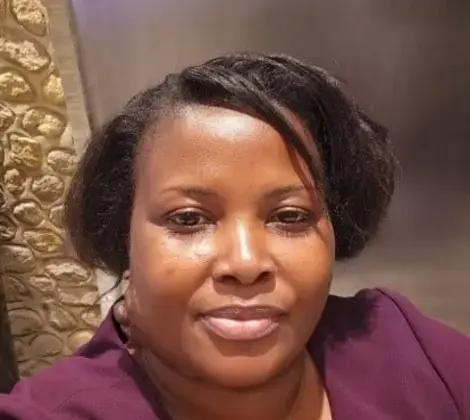
Scader: Meaningful political participation of women with disabilities in Malawi remains a challenge. In the 2019 tripartite elections, over 60 women were elected as ward councilors and among these women, only one woman with disability was elected against over four contestants. The World Bank reports that as of 2022, only 23% of parliamentarians are women. There are no women parliamentarians with a disability.
Additional barriers include:
-
Physical barriers which often prevent women with disabilities from accessing political spaces, such as polling stations and public meetings. This limits their ability to participate fully in electoral processes.
-
Deep-rooted societal attitudes and stereotypes surrounding disability continue to stigmatize and discriminate against women with disabilities.
-
Archaic laws [despite that] Section 40 of the Malawi Constitution provides for political rights to all. However, the Constitution does not create an enabling environment for women and girls with disabilities with respect to elections. Several legislative frameworks – including Section 51 (2)(b), Section 77 (3) and Section 80 (7)(a) of the Constitution, as well as Section 27(2) of the Local Government Elections Act – deny those with psychosocial disabilities the right to vote and stand for election. Consequently, this puts women with psychosocial disabilities at more of a disadvantage to participate in political and public life.
How can we address these barriers and work to eliminate discrimination against women with disabilities in your country?
Scader: My recommendations to address these barriers include:
-
Support advocacy to review relevant legislation like the Gender Equality Act, Local Government Act and the Malawi Human Rights Commission Act to provide for the inclusion and representation of women with disabilities in political and public offices.
-
Advocate for inclusive electoral processes.
-
Support women with disabilities as aspirants to run for office.
-
Capacity building and training - Support initiatives focused on building the political capacity of women with disabilities. Through training programs, workshops, and mentorship opportunities, equip women with disabilities with the skills and knowledge needed to actively participate in political activities.
-
Link women with disabilities [aspiring to run for office] with mainstream networks or campaigns focused on increasing women’s political participation in order to amplify their voices. These networks play a crucial role in empowering women to overcome challenges and actively engage in political processes.
